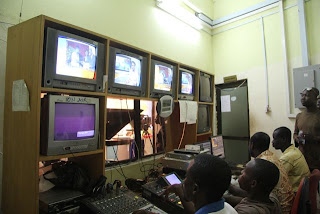 |
| Kaneshie Station (or as the TroTro Mate would call it: Knesh! Knesh! Knesh! Knesh Kneshie!) |
Side note: One of the most interesting vending booths I've come across thus far was at Circle Station where I found a sign that advertised "Music, Movie and File Downloads." Next to the sign (well, the word "sign" is a bit of a exaggeration, it was a printed Word document set on the landscape setting and size 18 font ... a re-branding exercise may need to be in effect) a few guys sat with a laptop and with what I presume is high speed internet connection and knowledge of how to download MP3s.
Anyways, the overcast you see in the above photo cleared a bit in the afternoon and a relaxing time was had at Kokobite beach. We snacked on the baguette and hummus we bought at the ludicrously expensive Western-style supermarket Koala, otherwise known as the place where a chorus of white people can be heard nostalgically moaning about the prices of the packaged goods we so cherish and love back home. (par example: "This can of Alphaghettis costs nine cedi! Nine cedi! You can get this for free at a homeless shelter back home!).
Unlike Bojo beach which markets itself as more of a isolated resort and where visitors are restricted to purchasing food and drink at its semi-upscale restaurant, Kokobite is free, popular and offers a variety of food and drink services. A series of budget hotels line the beach, each with their own bar and restaurant. Behind these hotels is an entire village that is quite hustling and bustling at nighttime.
 |
| Posing Ninja-style for the camera |
Kokobite is a very popular tourist destination and this is evident in how much more accustomed the locals are to seeing foreigners. You don't get the same amount of obroni heckling as you would in say Hohoe or even in most parts of Accra, for that matter. Those who take the most interest in foreigners are often children. And, as it happens, foreigners often take a lot of interest in the children as well. We were fortunate to be accompanied by a group of very un-shy kids for most of our time at the beach. Aside from playing with our electronic gadgets, building some sand sculptures and tasting some hummus (they hated it), a few of the boys answered my request to teach me some words in "Ga" - a popular language in Ghana. Boys being boys, my lesson plan for the day included the Ga words for: stinky armpit, fart, punching, boobs and penis. After pleading for terms that may be slightly more useful outside 8-year-old boy social circles, I was privy to learning the words for sand, water and hair.
 |
| Pineapple sellers take a break to chill out with us. |
 |
| David (I think) goes through Melanie's iPod library |
One of the pineapple sellers, a girl of 14 years of age or so, asked to see the Bradt Guide to Ghana that was lying next to us (for my bitter opinion on this book I invite you to revisit my Wli Falls blog entry). She flipped through to one of the glossy photo pages and pointed to a picture of a woman who she said was her mother!! How great is that! I really hope it's true and she didn't pull one over on us!
 |
| A girl selling us some pineapple showed us a picture of her mother in the Bradt Guide Book for Ghana. Small World! |
 As the sun set, we walked through the village looking for a restaurant. Originally, I wasn't planning on staying the night. But I informed my friends that a good meal and a glass of wine could persuade me to do almost anything at that point.
As the sun set, we walked through the village looking for a restaurant. Originally, I wasn't planning on staying the night. But I informed my friends that a good meal and a glass of wine could persuade me to do almost anything at that point. Finding a restaurant was easy-peasy! As it turns out, the best restaurant in the world is located right in Kokobite (take a look at the sign at the right)! How could we resist such an alluring promise??
At least the sign was honest, managing our expectations with the modifier "probably." Imagine the horror had Kokobite Garden confirmed their culinary mastery on this hand-painted sign with a cocky tagline like "Best in Town and Most Definitely the Best in the World"!
At least the sign was honest, managing our expectations with the modifier "probably." Imagine the horror had Kokobite Garden confirmed their culinary mastery on this hand-painted sign with a cocky tagline like "Best in Town and Most Definitely the Best in the World"!
Alas, as you may have guessed, Kokobite Garden is PROBABLY NOT the best restaurant in the world. In fact, I am quite confident that this spot is in fact amongst the more mediocre restaurants I've been to in Ghana and PROBABLY even in town. Though the atmosphere and the service were A+, the food was nothing to write Le Cordon Bleu about and they ran out of wine when we arrived (!!!). The absence of this precious nectar required me and a friend to run out on a mission to the nearest spot that sold wine (not an easy task I tell you). In honour of our American friend Tyler, who was scheduled to return home the following night, we purchased a bottle of wine called "Obama." It was PROBABLY one of the least delicious wines I've tasted thus far but I assure you this has no reflection on the president himself. Probably.







































